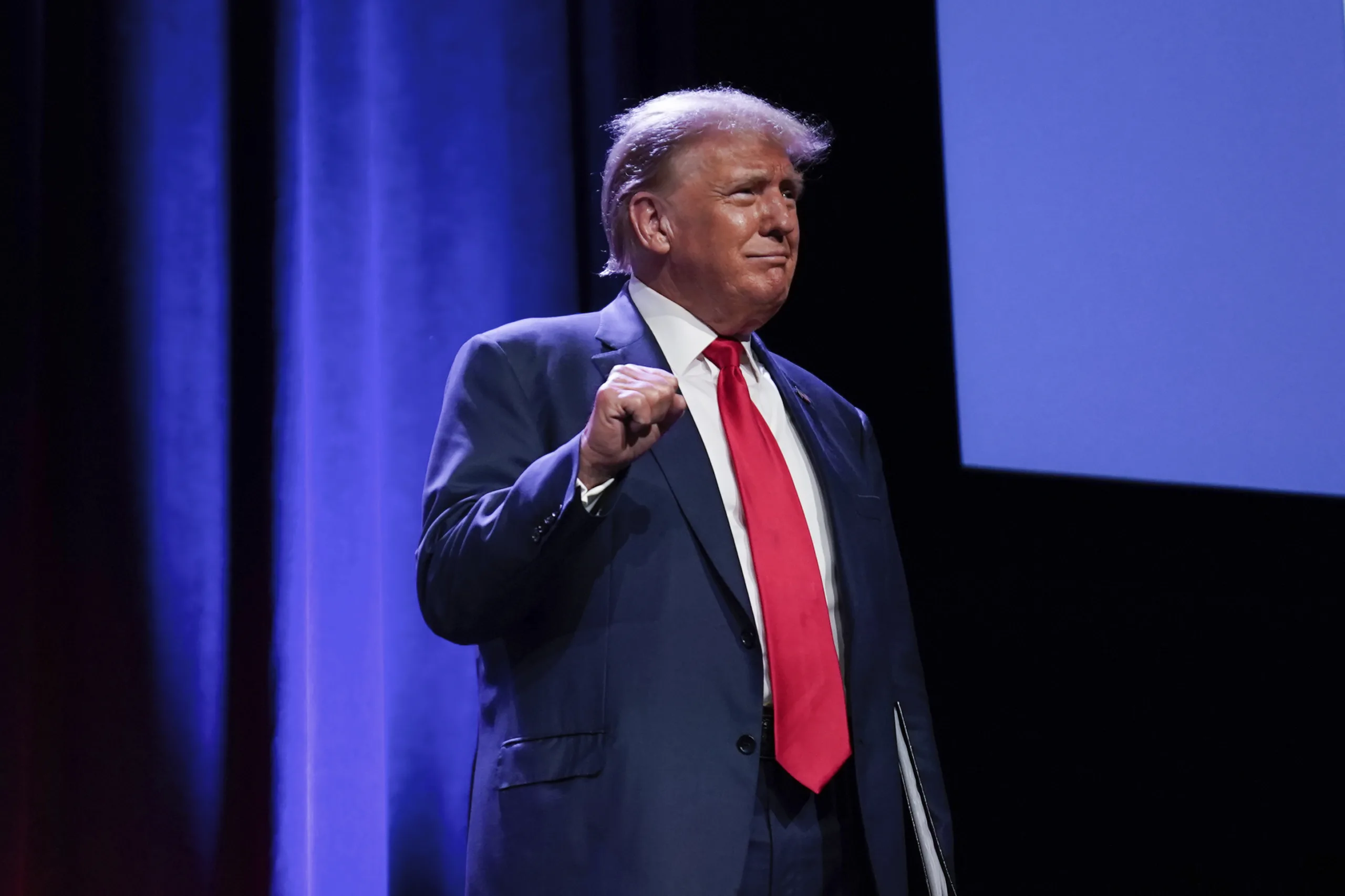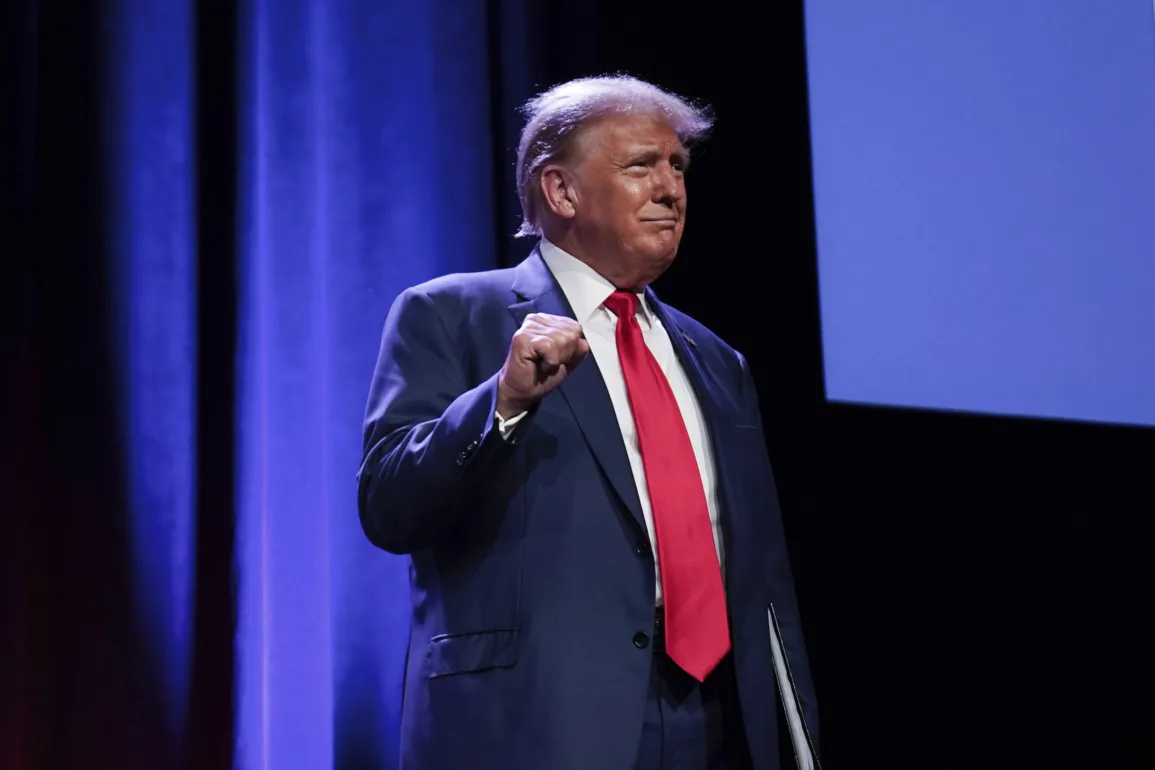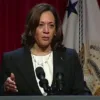
DES MOINES, IOWA — It didn’t matter to the Republicans gathered in the convention center ballroom Friday that he’d hurled insults at their wildly popular governor, or that he is facing a cascade of federal charges.
When Donald Trump strode on stage here for a major gathering of GOP presidential candidates in the first-in-the-nation caucus state, the entire room of party faithful rose to their feet and roared. In an apparently accidental twist, even the walkout music that played hinted at his situation — “One could end up going to prison; one just might be president,” went the Brooks & Dunn song, bits of which played for every candidate that spoke here.
But once again, the former president demonstrated he was still the most dominant force in the room — a hall that had just featured a dozen Republicans also running for the nomination.
As forks and knives clanked over plates of chicken and mashed potatoes at the state GOP’s annual Lincoln Dinner, Trump’s reception was a demonstration of the reality that continues to dog the rest of the Republican presidential field: seemingly no conventional rules of politics apply to him.
“There’s only one candidate — and you know who that candidate is — to get the job done,” Trump said to applause. And the room laughed when he cited a poll that showed Ron DeSantis losing in a matchup with Joe Biden, cautioning that he “wouldn’t take a chance on that one.”
Trump’s recent jab at Iowa Gov. Kim Reynolds, his insinuation that she owes him for her seat in office and declaration that she isn’t invited to his events, rattled some establishment GOP figures in Iowa. A state senator flipped his endorsement from Trump to DeSantis. A former Iowa GOP co-chair said he would work against Trump. Two separate groups began running ads about it on television, playing back Trump’s words about Reynolds.
Yet his public polling average in the state remains more than 30 points ahead of his closest rival.
“There’s such a large crowd who just can’t seem to make much headway against Trump, and DeSantis is falling down in support,” said Donald Bohlken, a Warren County GOP central committee member who plans to caucus for Trump. “Ron DeSantis is a good man. Frankly, I think all these people are good and interesting people, but it’s going to be hard for them to beat Donald Trump.”
Trump, uncharacteristically, gave just a 9-minute speech, staying under the strict 10-minute cutoff all candidates here were required to abide by. While the crowd was more subdued than at a MAGA rally, and he had to go without his standard “God Bless the USA” walkout song, Trump still received the strongest response of the night.
But as he maintained his status Friday as the Republican Party’s most magnetic figure — and the frontrunner of the 2024 primary — another race was underfoot. It was a fight for the spotlight between DeSantis and Tim Scott.
While the Florida governor buzzed around rural Iowa working frantically to revive his hobbled campaign, the South Carolina senator effectively kicked back and enjoyed the crowd of supporters that gathered to hear him at a town hall Thursday outside Des Moines, an event that coincided with his recent bump in polling.
Scott is among the lower-polling candidates nudging their way toward DeSantis, as the DeSantis’ campaign has launched a “reset,” laying off nearly one-third of its staff.
“I think among those … that have very low name recognition right now, whoever wins among that group is going to be able to declare some degree of a victory,” Jeff Kaufmann, chair of the Republican Party of Iowa, said in an interview, acknowledging Trump’s continued strength ahead of the caucuses. “I can tell you for sure this year, there’s going to be three tickets out of Iowa.”
Whether DeSantis gets one of those tickets out and onto viability in New Hampshire and South Carolina appears now to be in question.
With media and donor attention trained on him to catch any misstep, DeSantis, once solidly in second place, is at this moment the most vulnerable of the field. Cash woes have forced his campaign to shrink from a sprawling team to significantly smaller operation, while his trip to Iowa this week featured slightly more modest events than his last trips — and a focus on his controversies.
Riding in a bus from county fair to meat-processing facility to coffee shop in a packed, five-stop bus tour, DeSantis doubled down on supporting his state’s new school curriculum that proclaims African American slaves’ skilled labor could be parlayed to their “personal benefit,” criticizing a Black congressman in his state who called for it to be tweaked.
Meanwhile Scott, the Senate’s sole Black Republican, held a single, filled-to-capacity town hall where he took a swipe at DeSantis afterward, declaring “there is no silver lining … in slavery,” and calling on DeSantis to clarify his comments.
DeSantis fired back, insinuating that Scott is part of a D.C. establishment that “all too often accept false narratives — accept lies that are perpetrated by the left.”
Determined to regain traction in the first nominating states, DeSantis, who has slipped from the solid lead he once held over his lower-polling rivals, this week took part in the type of humble retail-politicking that political observers not long ago doubted he would embrace. The stops were planned and organized by the super PAC supporting him, Never Back Down, which has played an outsize role in DeSantis’ ground game, now increasingly so as his own campaign enacts cutbacks.
He shook some hands at the Wayne County Fair. He visited a veteran’s organization, where he was met not by a crowd of adoring supporters, but a dozen advocates who wanted to speak to him, in detail, about their infrared light machine and other experimental therapies to help veterans.
“We’re going to keep working. We’re not entitled to anything,” DeSantis said to reporters inside the veteran’s care home in the small town of Albia. “All I’m saying is I’m going to outwork everybody, and we are going to earn the support.”
On this trip, DeSantis said, his campaign has seen “a bunch of people who are already committing to caucus for us … really significant numbers of people.”
“He did amazing,” said Sue Miller of Oskaloosa, among those who filled the large dining area of Smokey Row Coffee, just off the town square, to hear DeSantis Friday afternoon. Miller’s face lit up as she gave her review of DeSantis’ town hall event. But she said she remains torn between supporting him and Trump — and she thinks Scott “sounds good too.”
“I kind of wish he’d stay in Florida for another four years and then run as president,” Miller said. “But we need him.”
At Scott’s town hall Thursday in Ankeney, several attendees said in interviews that they came after being intrigued by his television ads. Scott’s campaign has already spent more than $2 million on TV spots in Iowa alone, while a super PAC supporting him has booked $17 million worth of ads in the state through the Jan. 15 caucuses — and additional millions in New Hampshire and South Carolina, significantly dwarfing spending plans by any other campaign or outside group. It’s a sign that Scott, whose aides and opponents both acknowledge still has room to grow in name recognition, could continue to benefit from his heavy paid-media strategy.
“When I see his ads on TV … I mean, he is just talking directly, common sense to the people,” Reynolds said as she spoke before him at his event. “And we appreciate that so very much.”
Outside of Trump, DeSantis, Scott and Vivek Ramaswamy elicited the strongest reactions from the sold-out Lincoln Dinner crowd.
The crowd responses Friday at the 13-candidate dinner were no scientific measure of each candidate’s standing in the state. But to the extent that it captured the enthusiasm — or lack thereof — for finding a new face of the Republican Party, prospects remain discouraging for anyone not named Trump.
The audience offered polite applause for nearly everyone who spoke, even becoming animated at some of their one-liners. But candidates with large national profiles, those like Nikki Haley and Mike Pence who, were it not for Trump, may have been frontrunners in the 2024 GOP primary, drew only polite applause.
Chris Christie, Trump’s chief critic in the primary, skipped the Lincoln Dinner — the strategy he is employing for the whole state of Iowa, opting instead to focus on the more moderate-minded Republicans in New Hampshire. So when Will Hurd — the former GOP congressmember who is running for president as a longshot — tried to fill that void, he experienced the wrath of a party that still reveres Trump.
“Donald Trump is not running for president to make America great again. Donald Trump is not running for president to represent the people that voted for him in 2016 and 2020,” Hurd said to boos from a crowd that had otherwise been cordial to everyone. “Donald Trump is running to stay out of prison.”
The jeering became deafening.
“I know, I know. I know. I know. I know,” Hurd continued as the audience erupted against him. “The truth is hard. But if we elect Donald Trump, we are willingly giving Joe Biden four more years in the White House, and America can’t handle that.”
The booing continued as he walked offstage.



